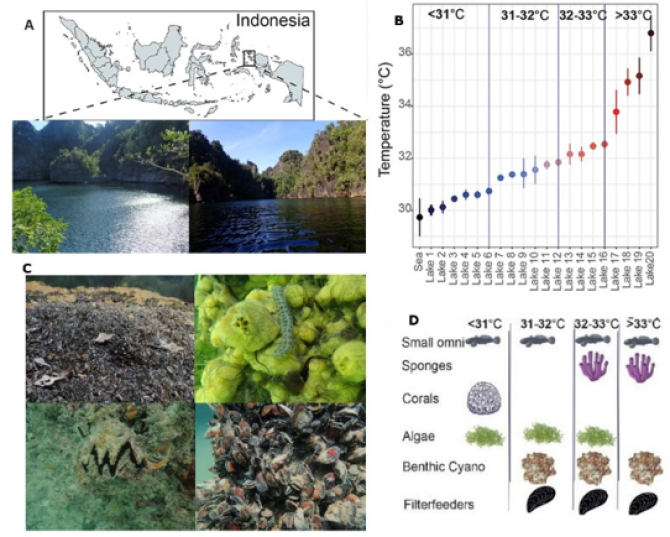
Project
Marine Time Machine: Using marine lakes to understand marine species community structures in the future
Two major issues for marine coastal ecosystems and their biodiversity are increasing sea surface temperature and nutrient concentrations.
Motivation
The combined effect of increasing temperature and eutrophication can have negative impact on benthic organisms such as corals and molluscs, but could enhance the expansion of macroalgae, sponges and cyanobacteria. Therefore, the reefs of the future will likely look and function differently from current coral dominated ecosystems. A major challenge to science it so understand and predict the response of marine species composition and communities from environmental perturbation. In an ttempt to fill this knowledge gap, marine lakes of Raja Ampat, Indonesia will be used as model systems to study future climate change scenarios and to predict the responses of coastal species communities under different degrees of eutrophication.
Aims and objectives
Marine lakes of similar ages, sizes and with high organic matter loads, but differing in temperature regimes (30-37 degrees Celsius), I will work on the following research objectives:
- Make a taxonomic overview of molluscs in marine lakes and coastal area of Papuan water.
- Quantify the variation in composition of species communities and functional groups of molluscs in relation to temperature gradients represented in marine lakes.
- Quantify the influence of environment to the composition and structure of major benthic communities in the marine lakes and reef areas.
- Develop new understanding of shifts in foodweb structure among major benthic groups under predicted climate change scenarios with increased eutrophication.
Method
Mollusc species diversity as well as their functional traits in marine alkes and coastal areas of Papua will be recorded and identified to assess differences in community composition and functional diversity of molluscs among sites and under different scenarios. Furthermore, temporal and spatial variation in total benthic community composition among marine lakes and reefs in response to environmental change will be assessed and the related shift in the energy flow from primary producers to consumers. Thus foodweb structure will be elucidated across natural communities in the marine lake model system.
Publications
